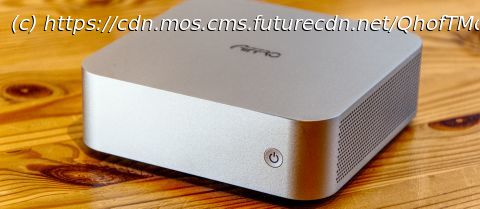Welcome to the NUC NAS
30-second review
With so many powerful NUC systems on the market and relatively inexpensive NVMe drives, one obvious use for them in combination is high-performance NAS (network-attached storage).
That’s exactly the logic that drove Aiffro when its engineers developed the K100. The objective was to make a NUC-sized NAS with room inside for four M.2 NVMe SSDs but no SATA or conventional hard drives.
For certain contexts, NAS are transitioning away from hard drives to solid-state storage, and, in theory, the K100 could hold as much as 16TB of space based on currently available capacities.
However, the K100 doesn’t come with a user-supplied operating system, and at a starting price of $399 for a machine without storage included, this isn’t a budget pathway to a performance NAS.
However, where it gets even more questionable is that the K100 only has a single 2.5GbE LAN port. Irrespective of the NVMe drives you put inside, the maximum network throughput will be around 280MB/s, and the K100’s CPU doesn’t have the power for NAS-based processing.
It is unclear why you might buy this over a dedicated SSD NAS or a $400 NUC. Since the dedicated NAS will have a pre-installed OS, it will perform better than this solution.Aiffro K100 All-SSD NAS: Price and availability
Save 15% on the Aiffro K100 with the code 56ZBSWSFMRBW
Simply click our View Deal button, and the discount will be applied to the cart when you buy.
How much does it cost? From $400
When is it out? Available now
Where can you get it? You can get it directly from Aiffro
At the time of writing, Aiffro had sold out of its barebones K100 stock, which is priced at $399.95. The only available model was the option with 256GB of pre-installed storage, which cost $50 more.
Other listed SKUs come with 1TB and 2TB, but all machines have 8GB of LPDDR4. The top SKU with 2TB costs $699, and none of the machines have an operating system installed.
UK prices start at £322 for the zero storage option and rise to £564 for the 2TB model.
European pricing is almost a direct Euro to US Dollar exchange.
When you rationalise that a NUC using the Intel N100 processor, typically with 16GB of RAM and 512G of storage, costs around $220, the K100 seems wildly overpriced.
What’s most disturbing about this pricing is that the cost difference between the barebones and 2TB options is $300. A steep price hike for merely adding a 2TB NVMe that you can buy from Amazon.com for close to $100, as this machine doesn’t come with Windows.
Value: 2 / 5Aiffro K100 All-SSD NAS: SpecsAiffro K100 All-SSD NAS: Design
Metal enclosure
Limited ports
Awkward access
Many NUC systems use plastic enclosures that aren’t very robust and tend to age rather rapidly, but the one that the K100 uses has at least metal, which the makers declare to be an “Aluminum alloy”.
At just 117 x 112 x 34mm, this is almost exactly the same size as the original Intel NUC and not anything that looks like it might be a NAS. According to the product notes, it is possible for VESA to mount the K100 with an accessory. But that wasn’t included in the box and isn’t available on the Aiffro website.
You get the machine, a tiny phone-type USB-C phone adapter, and a USB-C cable to connect that PSU to the K100. The PSU is rated to 65W, which is more than enough to power this system.
Compared to a conventional NUC, the first noticeable thing about the K100 is how few USB ports it has and that it has no ports at all on the front. On the back is a single 2.5GbE LAN port, HDMI 1.4, two USB 2.0 Type-A ports and three USB-C. One USB-C is the power inlet, and the other supports USB 3.2 Gen 2.
While it is possible to use this machine as a PC, it lacks some of the expected ports, like an Audio jack, and does not have WiFi inside.
Access to the interior is very similar to the Beelink SER8 we recently reviewed. Entry begins by pulling off the rubber feet to reveal four screws, and then once inside, there are another four screws to remove the heat spreader.






